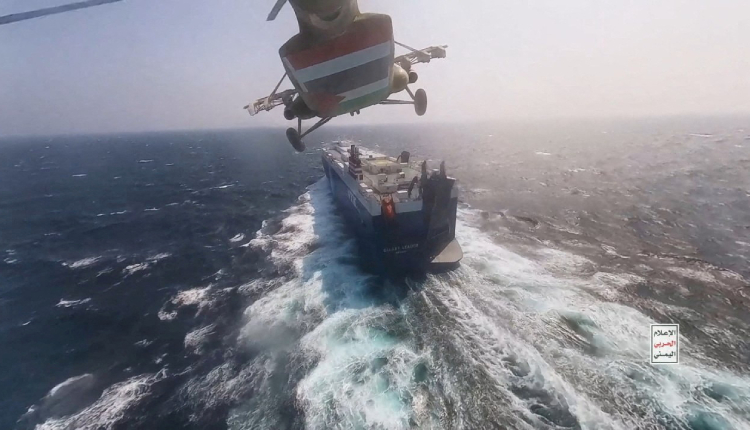The Houthi attacks in the Red Sea soared by 500 per cent since the outbreak of the war on Gaza, leading to a major global shipping crisis, Al Arabiya reported on Thursday.
Over the past month, the Houthis have fired drones and missiles at ships transiting the Red Sea, one of the most crucial waterways in the world.
These attacks are impacting a major artery in East-West trade, for various commodities especially oil, as ships access the Suez Canal via the Red Sea.
The attacks have forced a large number of shipping companies worldwide to suspend their operations through this vital trade route.
The Houthis said they would continue their attacks as long as Israel bombs civilians in Gaza.
The group also warned it would attack U.S. warships if the group itself was ever targeted.
According to Al Arabiya, citing experts on the matter, the escalation will not only heighten regional turbulence, but will also “have a worldwide impact on the price of everything, from everyday supermarket staples to jet fuel.”
The UK’s Foreign, Commonwealth and Development Office (FCDO) said in a statement to the news outlet that they were still monitoring the unfolding threat in the Red Sea, and have registered an unprecedented surge in the attacks since November.
“The United Kingdom condemns in the strongest terms the illegal and unjustified attacks on commercial shipping in the Red Sea by Houthi militants,” FCDO said. “Houthi attacks on commercial shipping in the Red Sea have increased 500 percent between November and December.”
Prices of Fuel and Commodities
A senior commodity broker at Starfuels in Dubai and oil specialist, Matt Stanley, told Al Arabiya English that the attacks have affected their firm and that they have “inundated with calls” regarding how the oil prices in the region and the wider world will be affected.
“Remember, about a trillion dollars of trade a day goes through the Suez Canal,” he said.
“About a third of the world’s oil goes through the Suez Canal. It’s a highly important shipping route, especially geographically if you’re in the East Mediterranean – such as Greece, Turkey, Italy … those kinds of places.” he explained.
“A lot of their crude feedstocks for their refineries, which go to produce the oil that their countries consume, now come from the Middle East because one of the major shifts in dynamics is that they can no longer buy from Russia.”
The oil specialist further added: “So, now, they have to source it from elsewhere, and the majority comes from the Middle East.”
Diversion of Ships costing millions
The majority of vessels are now ditching the Suez Canal and the Red Sea to go around Africa via the Cape of Good Hope.
Stanley said that if every investor decides to take this route, “it adds on about 14 days (to the length of shipping time), which is about $1 million more in costs.”
According to Al Arabiya, this will increase the cost of shipping, the cost of container rates, and the prices that consumers pay.
UK’s Institute of Export and International Trade said that the attacks are obstructing global supply chains and food supplies, which might lead to a jump in basic household supplies like rice, tea, coffee, meat, and fish.
Effects on jet fuel
Stanley also highlighted that the most immediate effect of increasing shipping costs will be seen in the price of jet fuel for commercial planes, especially in Europe.
“On oil products, we think the quickest impact on end-user prices will be on jet fuel. Europe gets close to 40 per cent of its jet fuel from the Middle East,” he said.
Yemeni researcher at Middle East and North Africa Program Chatham House, Farea al-Muslimi, told Al Arabiya that the impacts on prices are yet to be seen.
“So far, it has not negatively impacted oil prices, but the shipping costs – even from areas that are not just the Red Sea – are gradually being impacted and of course the insurance (prices) for longer alternative routes.”


